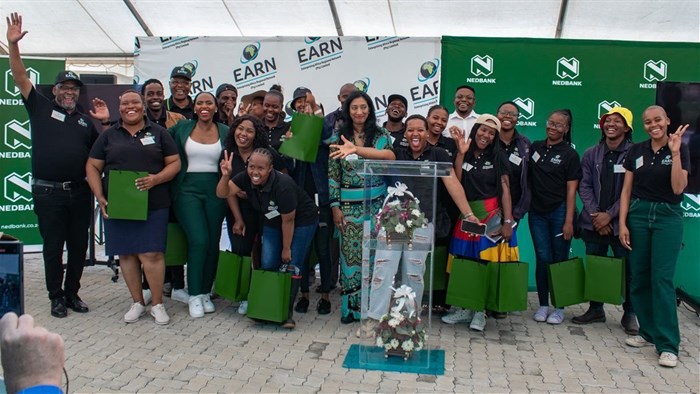Nedbank has announced its contribution of R6.5m to support 20 young South Africans through its Enterprise and Supplier Development Programme (ESD) to participate in the Agripreneur Development Programme, a subsidiary of African Greeneurs, the agriculture and training arm of the Enterprising Africa Regional Network (EARN).

Group image of EARN Agripreneur Development Programme participants with speakers at a recent event to showcase the programme
The programme boasts a comprehensive 360° curriculum that is created to equip young Africans with the necessary technical and business skills to develop their own profitable, sustainable and growth-oriented commercial agribusinesses.
Training Phases: Activate and Accelerate
Activate Phase
The first 3 months of the programme are known as the Activate Phase, which begins with a comprehensive assessment and candidate selection process, followed by intensive onsite skills development dedicated to practical business experience and insight into the technical nature of agribusiness. It also includes investment readiness training and the creation of an initial development plan, which encompasses an assessment of the land on which they will be settled, as well as testing of its soil and water.
Accelerate Phase
During the remaining 9 months of the programme – the Accelerate Phase – trainees gain practical experience by completing a one-season growing cycle, which provides them with commercial production experience while learning on the job. During this time, they get hands-on experience with the farm operations, infrastructure, and facilities necessary to run growth-oriented agribusinesses, as well as access to ongoing coaching and mentoring to ignite their inner agrichampion.
Kobang Maluleka, managing director at African Greeneurs, the agriculture and training subsidiary of EARN, says that the organisation’s goal is to create an enabling environment for African entrepreneurs to grow profitable and sustainable businesses that will compete regionally, nationally, and internationally.
Creating agripreneurial champions
"Our Agripreneur Development Programme aims to address the imperative of food security, employment, job creation and growth in the South African economy. While the entire programme is carefully curated to create agriculture champions, 2 aspects truly set our programme apart. The first is our meticulous candidate assessment and selection process. We strongly believe in empowering the future of agriculture and agribusiness, and that begins with identifying individuals with the potential to make a real impact in the field.
"The second is the exit strategy, which equips our learners with an added boost for success. This encompasses post-training land placement, which sees trainees settled on their land when they complete the programme and connecting graduates to funders, suppliers, coaches, and mentors, as well as access to processing infrastructure, markets and logistics, and other invaluable support," says Maluleka.
Nedbank’s senior manager for enterprise development, Nirmala Reddy, says that Nedbank actively seeks out and pursues opportunities to support communities, develop and grow entrepreneurs, foster job creation opportunities, and contribute to the overall development of a sustainable and robust social structure in South Africa.
Driving growth and empowerment
"This noteworthy initiative is one such opportunity, and Nedbank is proud to partner with African Greeneurs. With the use of modern agriculture methods, infrastructure, and the latest technology, this comprehensive programme helps agripreneurs produce high-quality yields to generate income, trigger job creation and contribute to the betterment of their communities and beyond. We are so proud to report that our young trainees are already producing top-quality horticultural products for many of South Africa’s leading retailers."
Maluleka adds that the programme uses smart agriculture and innovation as the catalyst for attracting young people to agriculture, while also improving productivity, efficiency, and sustainability. ‘Our goal is audacious: We aim to settle 10 agripreneurs on their productive land per quarter, or at least 40 agripreneurs per year. In 5 years, we would have a minimum of 200 agripreneurs who would have completed the 12-month programme and settled on their land running successful agribusinesses.
"If these agripreneurs were to create 50 jobs on average, a minimum of 10,200 guaranteed jobs would be created in primary agriculture alone in 5 years with only 1 stream. If you doubled the number of streams – the number of job opportunities would also double – that is something worth striving for, and we’re delighted that Nedbank is helping us make it happen," Maluleka concludes.































